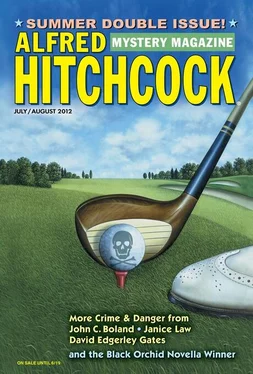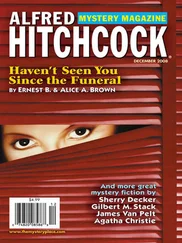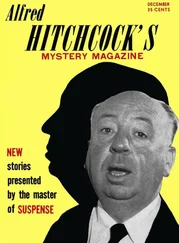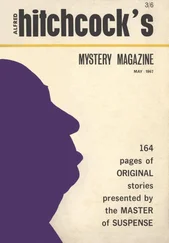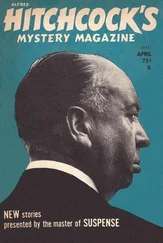Donald Moffitt - Alfred Hitchcock’s Mystery Magazine. Vol. 57, No. 7 & 8, July/August 2012
Здесь есть возможность читать онлайн «Donald Moffitt - Alfred Hitchcock’s Mystery Magazine. Vol. 57, No. 7 & 8, July/August 2012» весь текст электронной книги совершенно бесплатно (целиком полную версию без сокращений). В некоторых случаях можно слушать аудио, скачать через торрент в формате fb2 и присутствует краткое содержание. Город: New York, Год выпуска: 2012, ISBN: 2012, Издательство: Dell Magazines, Жанр: Детектив, на английском языке. Описание произведения, (предисловие) а так же отзывы посетителей доступны на портале библиотеки ЛибКат.
- Название:Alfred Hitchcock’s Mystery Magazine. Vol. 57, No. 7 & 8, July/August 2012
- Автор:
- Издательство:Dell Magazines
- Жанр:
- Год:2012
- Город:New York
- ISBN:0002-5224
- Рейтинг книги:3 / 5. Голосов: 1
-
Избранное:Добавить в избранное
- Отзывы:
-
Ваша оценка:
- 60
- 1
- 2
- 3
- 4
- 5
Alfred Hitchcock’s Mystery Magazine. Vol. 57, No. 7 & 8, July/August 2012: краткое содержание, описание и аннотация
Предлагаем к чтению аннотацию, описание, краткое содержание или предисловие (зависит от того, что написал сам автор книги «Alfred Hitchcock’s Mystery Magazine. Vol. 57, No. 7 & 8, July/August 2012»). Если вы не нашли необходимую информацию о книге — напишите в комментариях, мы постараемся отыскать её.
Alfred Hitchcock’s Mystery Magazine. Vol. 57, No. 7 & 8, July/August 2012 — читать онлайн бесплатно полную книгу (весь текст) целиком
Ниже представлен текст книги, разбитый по страницам. Система сохранения места последней прочитанной страницы, позволяет с удобством читать онлайн бесплатно книгу «Alfred Hitchcock’s Mystery Magazine. Vol. 57, No. 7 & 8, July/August 2012», без необходимости каждый раз заново искать на чём Вы остановились. Поставьте закладку, и сможете в любой момент перейти на страницу, на которой закончили чтение.
Интервал:
Закладка:
Marley nodded. She had been dancing with a German company when she met Larkin, eight years ago, months after he’d broken with the CIA: bolted from a Central America station and begun spilling secrets. Marley wondered if she’d had any idea what she was getting into. Part of him wondered if John Larkin had.
“He wouldn’t have been buried at sea?” Marley said.
“Julianne wouldn’t hear of it. The other passengers wouldn’t have been happy, either. There must be fifty or sixty of them, expecting to get where they’ve paid to go. Bad advertising to dump bodies overboard.”
“How did you hear about this?”
“Julianne sent a wireless. We’re still friends.”
Rule had interviewed Larkin for an American wire service soon after his break with the agency. It had been a sympathetic interview. Good, from Phil Rule’s perspective, for establishing his credentials in anti-CIA circles.
Marley asked, “Did Julianne ask you to sell the news to us?”
Rule set about lighting another cigar. “That’s between you and me. All right?”
“Of course.”
“She doesn’t know you. You can be another journalist.”
“Do you mind if we open a window now?”
“Sure, go ahead.”
Marley undid the latches to the balcony, which was ornamental, too small to be functional. The view onto a side street that twisted toward the old city was softened by suspended dust. The outside air was as hot as that inside the room. But the enclosed smell of Rule’s cigar had begun to make him ill. It couldn’t have been the man himself. Apart from a few niceties about prostitutes, Marley knew that he and Rule were brothers under the skin.
Larkin had been different, according to the people at Langley who had known him in the field. Enthusiastic but squeamish. He’d had a different name with the agency, not that it mattered. By the time he gave his first interview about torture in Central America, everyone knew him as John Larkin, ex-Marine, ex-case officer driven by conscience to separate himself from his employer. The agency did its best to make his new career uncomfortable. After two years of being expelled from European countries, Larkin had ended up in the arms of the Cubans. Some said that was where he had been all along. Marley wasn’t certain. He’d thought some of Larkin’s claims were non sequiturs. Latin American dictators hadn’t needed CIA training to know how to torture. It would, he thought, have happened without us.
As for his Cuban comrades, did Larkin really believe they had clean hands? Or did they get a pass because they were fighting for the progressive cause?
He wished he’d been able to ask Larkin. Weren’t you squeamish about that?
“I’ve got to notify some people in Amsterdam,” Philip Rule said. “You know, keep up appearances. Julianne would assume I’ve done it. We have friends there. Progressives.”
“All right,” Marley said. There was no stopping Rule. Nobody at Langley would make it worth Rule’s while to damage his image. “Let me know who to expect.”
“It’ll probably be Donny Simmons. He was closest to Larkin.”
“Let me know when you’re certain.”
Marley took the elevator downstairs. A very fat man in a jeballa was checking into the hotel in the company of a boy who couldn’t have been ten. Marley walked out onto the street, feeling tight in the gut and angry, and walked a few streets to relax. It was impossible. Street children understood the meaning of his khaki suit and followed him, proposing to shine his shoes. Predatory adults closed in with offers that began, “Are you from America? My cousin works in New York. Would you like to see erotica?” At an avenue in the new city, he got a taxi that took him to his hotel near the port. His meeting with the Moroccan security officer wasn’t until eight that evening, and the man wanted to be bought dinner at the hotel, where the wine might be respectable. He was a thin, angular man in his forties who didn’t wear his uniform, but something in his eyes and manner alerted the service staff that this man meeting with the American should be treated well. He spoke to Marley, whose name he would never know, as if they were old friends, battered comrades in the war against Communism. King Hassan II might flirt with Moscow, but they both knew where his interests lay and, as important, who had trained his security service.
What would John Larkin have had to say about that? Marley wondered. That they needed us to teach them how to torture Bedouin rebels?
The security officer ate well and drank lavishly, and Marley gave him a name and said there might be more names. If any of Larkin’s friends arrived from Amsterdam, they would be held for the next plane out.
* * * *
The Tuhobic, a bulk carrier out of Rijeka, arrived late, after dark, and the customs officials boarded first. It was close to midnight when the ship was cleared, donkey carts trundled up to the dockside beside Mercedes sedans, waiting for baggage, and Marley and Philip Rule went aboard.
Julianne Helgeson was waiting in the ship’s lounge. Rule hugged her and said that Donny had gotten hung up at the airport, how was she holding herself together?
“I’m all right, Philip. I’ve had nine days to adjust.”
“John Larkin was on the side of the angels,” Rule said fiercely. “What happened?”
“His heart...”
Rule’s glance barely touched Marley. “Everyone’s going to ask — our friends in Amsterdam are bound to suspect — was it the agency? Did the bastards finally settle the score?”
“No, Philip. It was his heart.” Her face sagged. “He ran out of time. Perhaps he knew he wouldn’t have much, and that is why he worked so hard.”
“There are plenty of us ready to take up where John left off.” Rule’s color was high, his voice intense. If Marley hadn’t known him, he might have believed the man’s pretenses. Rule laid it on a bit longer before remembering to introduce Marley by the name on his passport. “Jim is a stringer for the Monitor . He’s read your husband’s books.”
Julianne Helgeson turned to Marley. “Have you, Jim?”
“With interest,” Marley said. “It must have been difficult for him, exposing CIA agents he’d known in his career.”
She nodded slightly. “It was necessary.”
“But it took courage, didn’t it?” Marley said with a sympathy he didn’t feel.
“Yes, it took courage. Our lives have been very difficult.” She turned to Philip Rule. “Philip, the purser was hoping to talk to you tonight. I want you to handle the arrangements. John would want to be buried in the United States. I’ll fly back with him.”
Rule popped up. “I’ll go find that purser.” He stopped. “What are you going to do? You could return to dancing.”
“I’ll continue John’s work,” she said. “Once we’ve taken care of things at home, I’ll go to Amsterdam. See if there’s a place for me in the organization.”
“I’m sure there will be,” Rule said.
“The gallant widow?” Her smile was bitter.
Rule shook his head. “No. You know your husband’s work better than anyone. I’m sure Donny will put you in charge.”
“Then I will do my best,” she said.
After Rule was gone, she leaned back on the sofa. Her eyes were wounded, but not that deeply. “Well, Charles.”
“Well,” Marley said, sizing up the woman he hadn’t seen in years. “Do you have anything for me?”
“We were on our way to meet two Russians in Rijeka. They were going to run John in Europe. I have their names.”
“Good girl.” He couldn’t help asking, “You didn’t — ah...?”
“No, I didn’t.”
“Eight years is a long time.”
“You didn’t know John.” She smiled. “I loved him despite everything.”
Читать дальшеИнтервал:
Закладка:
Похожие книги на «Alfred Hitchcock’s Mystery Magazine. Vol. 57, No. 7 & 8, July/August 2012»
Представляем Вашему вниманию похожие книги на «Alfred Hitchcock’s Mystery Magazine. Vol. 57, No. 7 & 8, July/August 2012» списком для выбора. Мы отобрали схожую по названию и смыслу литературу в надежде предоставить читателям больше вариантов отыскать новые, интересные, ещё непрочитанные произведения.
Обсуждение, отзывы о книге «Alfred Hitchcock’s Mystery Magazine. Vol. 57, No. 7 & 8, July/August 2012» и просто собственные мнения читателей. Оставьте ваши комментарии, напишите, что Вы думаете о произведении, его смысле или главных героях. Укажите что конкретно понравилось, а что нет, и почему Вы так считаете.
